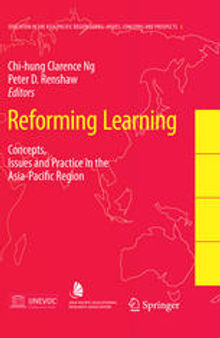 جزییات کتاب
جزییات کتاب
In the wake of the 1997 Asian financial crisis, various reform initiatives, policies and programmes have been carried out in different countries within the Asia-Pacific region. All these reform efforts aim to restructure different aspects of schooling in order to promote learning and to prepare students for future challenges in globalised economies. These measures to a certain extent challenge traditional practices, established arrangements and deep-seated assumptions related to different aspects of learning. The authors in this book discuss educational reforms in different countries in the Asia-Pacific region in light of student learning, clarify their concepts, evaluate implementation and impact on the learning processes, with a hope that we can learn better from each other and develop a better understanding of "contemporary" learning and teaching processes within the region. The central argument running through different chapters in this book highlights the importance of understanding reforms and learning within their historical, political and sociocultural contexts.Reforming learning involves changes in established cultural practices in our schools, classrooms, and other learning sites, and therefore inevitably arouses tensions and negotiations. The discussion in this book puts to the fore the disputable nature of reforming learning and the significance of contextualising the complex relationship between reforms and learning.



 دانلود کتاب
دانلود کتاب

 جزییات کتاب
جزییات کتاب





 این کتاب رو مطالعه کردید؟ نظر شما چیست؟
این کتاب رو مطالعه کردید؟ نظر شما چیست؟
